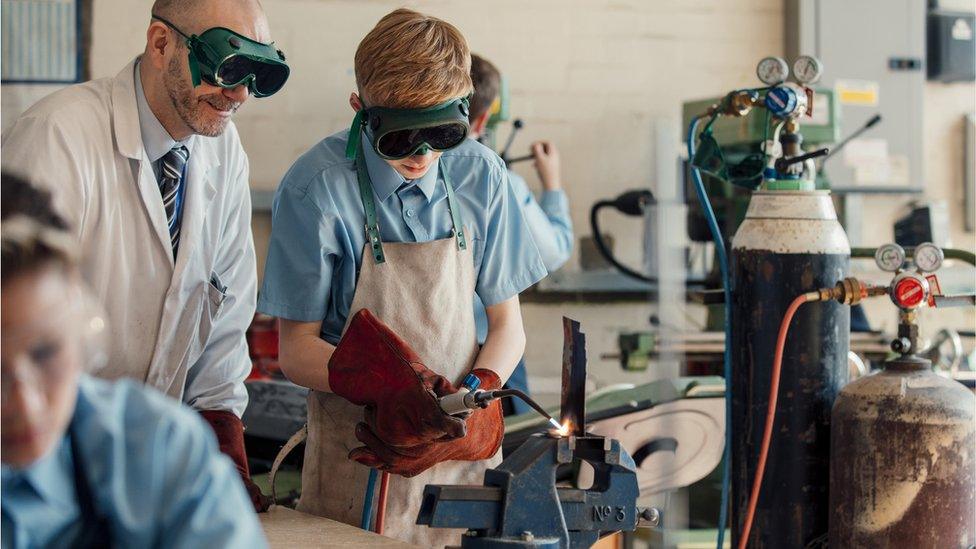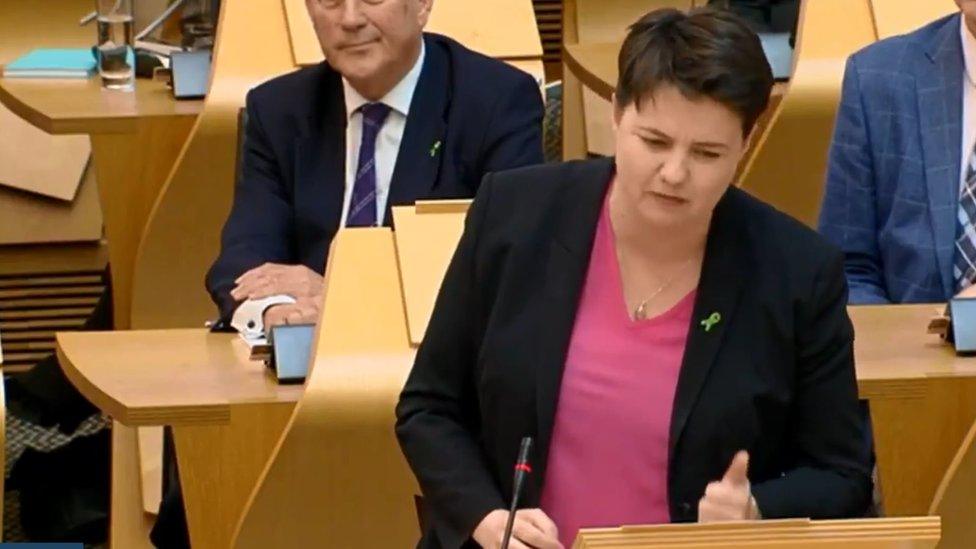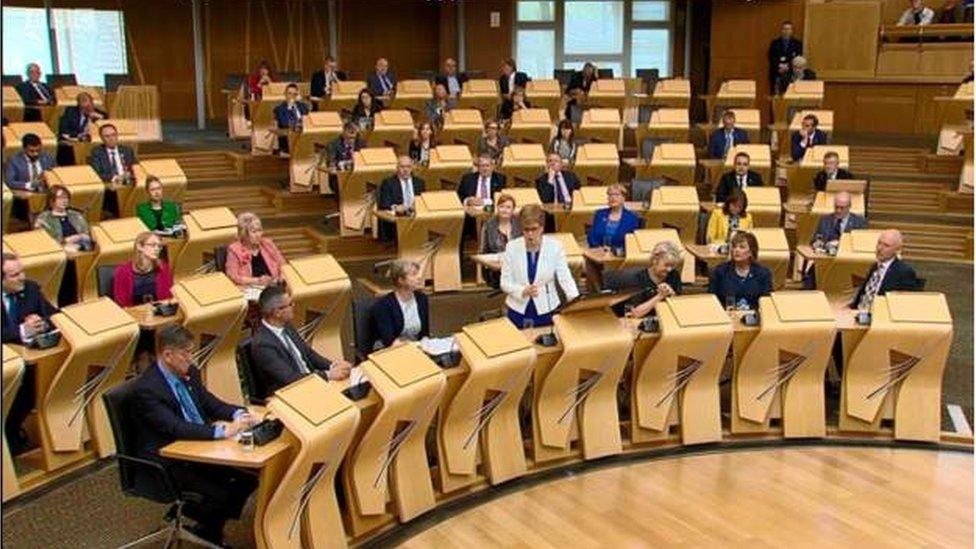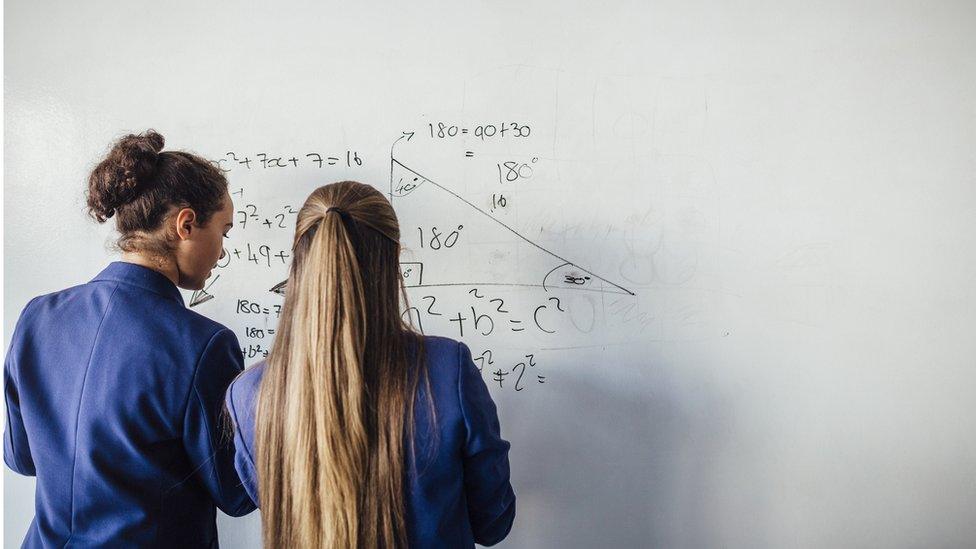Lack of subject choice for some exam pupils
- Published

Concerns over the choice of subjects available in some secondary schools came to the fore at First Ministers Questions.
Conservative leader Ruth Davidson highlighted how some youngsters get the chance to do just six qualifications in S4 while others do more.
The situation varies from school to school and from council to council.
But does the number of qualifications a youngster obtains in S4 really matter?
In the old days, it was simple.
At the overwhelming majority of state and private schools, an academically able student would sit eight O Grades in S4 then study for four or five Highers in S5.
Generally, able students would study two sciences and at least one foreign language in S3 and S4, unless there was a good reason not to.

Ruth Davidson said some pupils were only able to sit six qualifications while others had more choice
English and Maths were, of course, givens.
Fast forward 30 or 40 years and it's all very different.
The emphasis in schools now is on what qualifications someone has by the time they leave school - not what they have by the end of a particular year.
General rule
The overwhelming majority of students now stay on to S5 and most remain until S6 - these years are no longer geared towards the academically able.
The emphasis is also on the top level of qualification a student achieves in each subject. In other words, a National 5 would only be a stepping stone towards a Higher for the most able students.
Some students even bypass National 5s completely and work for two years towards their Highers, although this is still the exception.
Individual schools and councils have taken their own decisions on just how the new suite of qualifications, introduced in 2013, should work.
After five years, it is possible to look at how things have settled down.

The issue emerged during First Minister's Questions at the Scottish Parliament
As a rule though, schools offer youngsters the chance to study for six or seven National 4 or 5 qualifications in S4. The National 4 is broadly equivalent to a general pass in a Standard Grade - the National 5 is comparable to a credit pass in a Standard Grade or a good pass in an O Grade.
A small number offer S4 students the chance to do just five. Some - mostly in areas where there is competition from independent schools - allow eight.
Wrong answer
But, given this disparity, are students at some schools advantaged or disadvantaged?
There is no simple right or wrong answer.
One concern some have expressed is that if a student is only able to do five or six subjects in S4, they are effectively picking their Highers a year early.

However, that is not necessarily the case.
The student might do six N5s in S4, then do three Highers in S5, plus two more N5s, and follow this up with more Highers or Advanced Highers in S6.
It all depends on whether or not a school can find the right suite of qualifications for the individual.
Realistically though, the most able students are likely to spend S5 and S6 studying for Highers and Advanced Highers and not take additional N5s without good reason.
So does a child who studied for "just" six National 5s lose out?
Breadth of knowledge
Crucially, university admission officers look at Highers and Advanced Highers. Lower level qualifications are rarely a factor unless, a candidate for a particular course requires a National 5 in a subject they did not take at Higher level.
For instance, occasionally candidates who do not have Higher maths would be required to have N5 Maths.
But what about a candidate who is simply not offered the range of qualifications required?

In my own case, I achieved O Grades in French, Geography and Physics (as well as Arithmetic!) in 1987, but did not do Highers in these subjects.
This is an intriguing issue. Recently the Labour Party expressed concern about a drop in the number of people gaining a qualification in a modern language.
But others might argue that the number of young people gaining a qualification in a language is not the same thing as developing a knowledge of it.
Third language
Once, it was unusual to be introduced to a second language at primary school. A child who was not taking an O Grade in a modern language would only be exposed to it in S1 and S2.
Today, a primary school child would usually be expected to start learning a second or even third language.
Meanwhile, the "broad general education" in secondary schools lasts for three years rather than two.
Some parents have expressed concern that it may now be even harder than before for a student to study all three major science subjects - biology, chemistry and physics. However, some schools have always been reluctant to let someone do all three together without exceptional reasons.
The other concern might be that a young person who has eight National 5s and five Highers is simply at an advantage over one with five National 5s and five Highers.
It would not be an issue for colleges or universities, but if there was a fear that an employer might judge a young person unfairly on that basis, it touches on a different issue.
It implies a lack of understanding of the way the system is designed to work or the opportunities available to the individual candidate.
What is certainly true is that even after five years, some parents still have real questions and even anxieties over the changes.
That in itself is a problem, although it does not necessarily mean the system itself is wrong.